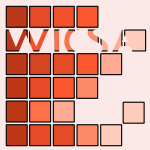78 papers:
 STOC-2015-LovettZ #difference
STOC-2015-LovettZ #difference- Improved Noisy Population Recovery, and Reverse Bonami-Beckner Inequality for Sparse Functions (SL, JZ), pp. 137–142.
 ICALP-v1-2015-CzyzowiczGKKSU #convergence #on the #protocol
ICALP-v1-2015-CzyzowiczGKKSU #convergence #on the #protocol- On Convergence and Threshold Properties of Discrete Lotka-Volterra Population Protocols (JC, LG, AK, EK, PGS, PU), pp. 393–405.
 ICALP-v2-2015-AlistarhG #polynomial #protocol
ICALP-v2-2015-AlistarhG #polynomial #protocol- Polylogarithmic-Time Leader Election in Population Protocols (DA, RG), pp. 479–491.
 QAPL-2015-BortolussiH #markov #modelling #performance
QAPL-2015-BortolussiH #markov #modelling #performance- Efficient Checking of Individual Rewards Properties in Markov Population Models (LB, JH), pp. 32–47.
 SPLC-2015-TeixeiraBG #evolution #multi #product line
SPLC-2015-TeixeiraBG #evolution #multi #product line- Safe evolution of product populations and multi product lines (LT, PB, RG), pp. 171–175.
 ICEIS-v1-2014-OliveiraB #independence #process #specification #towards
ICEIS-v1-2014-OliveiraB #independence #process #specification #towards- ETL Patterns on YAWL — Towards to the Specification of Platform-independent Data Warehousing Populating Processes (BCdSO, OB), pp. 299–307.
 ICPR-2014-TsukiokaK
ICPR-2014-TsukiokaK- Selection of Features in Accord with Population Drift (HT, MK), pp. 1591–1596.
 QAPL-2014-SpielerHZ #markov #model checking #modelling
QAPL-2014-SpielerHZ #markov #model checking #modelling- Model Checking CSL for Markov Population Models (DS, EMH, LZ), pp. 93–107.
 HT-2013-LiangCCK #how #modelling #social #social media
HT-2013-LiangCCK #how #modelling #social #social media- How big is the crowd?: event and location based population modeling in social media (YL, JC, ZC, KYK), pp. 99–108.
 VLDB-2013-MousaviGZ #database #knowledge base #mining #named
VLDB-2013-MousaviGZ #database #knowledge base #mining #named- IBminer: A Text Mining Tool for Constructing and Populating InfoBox Databases and Knowledge Bases (HM, SG, CZ), pp. 1330–1333.
 IFM-2013-MeryP #formal method #modelling #protocol #verification
IFM-2013-MeryP #formal method #modelling #protocol #verification- Formal Modelling and Verification of Population Protocols (DM, MP), pp. 208–222.
 SFM-2013-BortolussiH #approximate #behaviour #markov #modelling
SFM-2013-BortolussiH #approximate #behaviour #markov #modelling- Checking Individual Agent Behaviours in Markov Population Models by Fluid Approximation (LB, JH), pp. 113–149.
 DUXU-NTE-2013-ReisDR #usability #using
DUXU-NTE-2013-ReisDR #usability #using- Main Usability Issues in Using Virtual Environments for Older Population Warning Studies (LR, ED, FR), pp. 189–198.
 CIKM-2013-KimNC #approach #modelling #probability #social #social media
CIKM-2013-KimNC #approach #modelling #probability #social #social media- Modeling dynamics of meta-populations with a probabilistic approach: global diffusion in social media (MK, DN, PC), pp. 489–498.
 KDD-2013-SongZSHUS #modelling #probability #reasoning #scalability
KDD-2013-SongZSHUS #modelling #probability #reasoning #scalability- Modeling and probabilistic reasoning of population evacuation during large-scale disaster (XS, QZ, YS, TH, SU, RS), pp. 1231–1239.
 KEOD-2013-HafnerHWO #automation #ontology
KEOD-2013-HafnerHWO #automation #ontology- Semi-automated Ontology Population from Building Construction Drawings (PH, VH, HW, JO), pp. 379–386.
 KEOD-2013-MendesRB #development #information management #ontology #representation
KEOD-2013-MendesRB #development #information management #ontology #representation- Development and Population of an Elaborate Formal Ontology for Clinical Practice Knowledge Representation (DM, IPR, CFB), pp. 286–292.
 HT-2012-HartigH #linked data #modelling #open data #predict #query
HT-2012-HartigH #linked data #modelling #open data #predict #query- Query prediction with context models for populating personal linked data caches (OH, TH), pp. 325–326.
 CIKM-2012-ShenWLW #approach #graph #ontology
CIKM-2012-ShenWLW #approach #graph #ontology- A graph-based approach for ontology population with named entities (WS, JW, PL, MW), pp. 345–354.
 DAC-2011-EisenbergAS
DAC-2011-EisenbergAS- In silico synchronization of cellular populations through expression data deconvolution (ME, JNA, DSG), pp. 812–817.
 KDD-2011-Cormode #learning #privacy
KDD-2011-Cormode #learning #privacy- Personal privacy vs population privacy: learning to attack anonymization (GC), pp. 1253–1261.
 KDD-2011-MalbasaV #scalability
KDD-2011-MalbasaV #scalability- Spatially regularized logistic regression for disease mapping on large moving populations (VM, SV), pp. 1352–1360.
 SIGIR-2011-ChenTLJ #knowledge base #tool support
SIGIR-2011-ChenTLJ #knowledge base #tool support- A toolkit for knowledge base population (ZC, ST, AL, HJ), pp. 1267–1268.
 QAPL-2011-AndreychenkoCW #infinity #markov #modelling #on the fly
QAPL-2011-AndreychenkoCW #infinity #markov #modelling #on the fly- On-the-fly Uniformization of Time-Inhomogeneous Infinite Markov Population Models (AA, PC, VW), p. 1.
 SAC-2011-BelcaidBHP #clustering #performance #using
SAC-2011-BelcaidBHP #clustering #performance #using- Efficient clustering of populations using a minimal SNP panel (MB, KB, DH, GP), pp. 83–88.
 CIKM-2010-LangeBN #wiki
CIKM-2010-LangeBN #wiki- Extracting structured information from Wikipedia articles to populate infoboxes (DL, CB, FN), pp. 1661–1664.
 ICPR-2010-SfikasHN #analysis #clustering #multi #using
ICPR-2010-SfikasHN #analysis #clustering #multi #using- Multiple Atlas Inference and Population Analysis Using Spectral Clustering (GS, CH, CN), pp. 2500–2503.
 KDD-2010-LiuNYW #automation #named #wiki
KDD-2010-LiuNYW #automation #named #wiki- BioSnowball: automated population of Wikis (XL, ZN, NY, JRW), pp. 969–978.
 KEOD-2010-GillespieSC #case study #composition #modelling
KEOD-2010-GillespieSC #case study #composition #modelling- Satisfying user Expectations in Ontology-driven Compositional Systems — A Case Study in Fish Population Modeling (MGG, DAS, SSC), pp. 133–143.
 KEOD-2010-Girardi #learning #ontology
KEOD-2010-Girardi #learning #ontology- Guiding Ontology Learning and Population by Knowledge System Goals (RG), pp. 480–484.
 KEOD-2010-Ruiz-MartinezVMH #natural language #ontology
KEOD-2010-Ruiz-MartinezVMH #natural language #ontology- Populating Biomedical Ontologies from Natural Language Texts (JMRM, RVG, RMB, AGH), pp. 27–36.
 DAC-2009-TamPB #automation #validation
DAC-2009-TamPB #automation #validation- Automated failure population creation for validating integrated circuit diagnosis methods (WCT, OP, RD(B), pp. 708–713.
 ITiCSE-2009-AndersonL #collaboration #community #learning #student
ITiCSE-2009-AndersonL #collaboration #community #learning #student- Exploring technologies for building collaborative learning communities among diverse student populations (NA, CCL), pp. 243–247.
 ICALP-v2-2009-ChatzigiannakisMS #protocol
ICALP-v2-2009-ChatzigiannakisMS #protocol- Mediated Population Protocols (IC, OM, PGS), pp. 363–374.
 HCD-2009-LokmanHNN #analysis #difference #evaluation
HCD-2009-LokmanHNN #analysis #difference #evaluation- Website Affective Evaluation: Analysis of Differences in Evaluations Result by Data Population (AML, AFH, NLMN, MN), pp. 643–652.
 HIMI-DIE-2009-WiebeV
HIMI-DIE-2009-WiebeV- Application of Population Stereotypes to Computerized Tasks (JW, KPLV), pp. 718–725.
 IDGD-2009-GurleyN #bibliography
IDGD-2009-GurleyN #bibliography- A Systematic Review of Technologies Designed to Improve and Assist Cognitive Decline for Both the Current and Future Aging Populations (KG, AFN), pp. 156–163.
 KDIR-2009-PenaVP #data mining #mining
KDIR-2009-PenaVP #data mining #mining- Explorative Data Mining for the Sizing of Population Groups (IP, HLV, EP), pp. 152–159.
 KEOD-2009-Goldstein-StewartW #automation #design #knowledge base
KEOD-2009-Goldstein-StewartW #automation #design #knowledge base- Designing a System for Semi-automatic Population of Knowledge Bases from Unstructured Text (JGS, RKW), pp. 88–99.
 CASE-2008-SunZL08a #framework #optimisation
CASE-2008-SunZL08a #framework #optimisation- A unified optimization framework for population-based methods (JS, QZ, PBL), pp. 383–387.
 DocEng-2008-ObradorMMO #image #interactive #taxonomy
DocEng-2008-ObradorMMO #image #interactive #taxonomy- Image collection taxonomies for photo-book auto-population with intuitive interaction (PO, NM, IM, EOS), pp. 102–103.
 ICML-2008-ShringarpureX #named #search-based
ICML-2008-ShringarpureX #named #search-based- mStruct: a new admixture model for inference of population structure in light of both genetic admixing and allele mutations (SS, EPX), pp. 952–959.
 SAC-2008-CoelhoO #optimisation
SAC-2008-CoelhoO #optimisation- Dynamically tuning the population size in particle swarm optimization (ALVC, DGdO), pp. 1782–1787.
 SAC-2008-LuizPBR #approach #mobile #programming #search-based #using
SAC-2008-LuizPBR #approach #mobile #programming #search-based #using- A new approach to control a population of mobile robots using genetic programming (AL, FP, GB, MR), pp. 1602–1606.
 SAC-2008-MaK #algorithm #search-based
SAC-2008-MaK #algorithm #search-based- Dynamic populations in genetic algorithms (Z(M, AWK), pp. 1807–1811.
 SAC-2008-MitrofanovaM #evolution #modelling #simulation
SAC-2008-MitrofanovaM #evolution #modelling #simulation- Population genetics of human copy number variations: models and simulation of their evolution along and across the genomes (AM, BM), pp. 1309–1310.
 SAC-2008-ToledoFR #algorithm #problem #scheduling #search-based
SAC-2008-ToledoFR #algorithm #problem #scheduling #search-based- Evaluating genetic algorithms with different population structures on a lot sizing and scheduling problem (CFMT, PMF, KAR), pp. 1777–1781.
 DHM-2007-SunFC #evaluation #generative #modelling
DHM-2007-SunFC #evaluation #generative #modelling- Dynamic Generation of Human-Populated VR Models for Workspace Ergonomic Evaluation (TLS, WYF, CJC), pp. 979–987.
 ICSE-2007-TurhanB #re-engineering
ICSE-2007-TurhanB #re-engineering- A Template for Real World Team Projects for Highly Populated Software Engineering Classes (BT, ABB), pp. 748–753.
 CASE-2006-PonnambalamSSG #algorithm #assembly #parallel #search-based
CASE-2006-PonnambalamSSG #algorithm #assembly #parallel #search-based- PARALLEL POPULATIONS GENETIC ALGORITHM FOR MINIMIZING ASSEMBLY VARIATION IN SELECTIVE ASSEMBLY (SGP, SSS, SS, MG), pp. 496–500.
 ITiCSE-2006-GuerreiroG
ITiCSE-2006-GuerreiroG- Combating anonymousness in populous CS1 and CS2 courses (PG, KG), pp. 8–12.
 EDOC-2006-KutvonenMR #challenge #social
EDOC-2006-KutvonenMR #challenge #social- From trading to eCommunity population: Responding to social and contractual challenges (LK, JM, SR), pp. 199–210.
 ICML-2006-XingSJT #multi #process #type inference
ICML-2006-XingSJT #multi #process #type inference- Bayesian multi-population haplotype inference via a hierarchical dirichlet process mixture (EPX, KAS, MIJ, YWT), pp. 1049–1056.
 ICPR-v2-2006-YangLWW #clustering #markov #robust
ICPR-v2-2006-YangLWW #clustering #markov #robust- Robust Clustering based on Winner-Population Markov Chain (FWY, HJL, PSPW, HHW), pp. 589–592.
 SPL-BOOK-2006-HallsteinsenSBF #architecture
SPL-BOOK-2006-HallsteinsenSBF #architecture- Dealing with Architectural Variation in Product Populations (SOH, GS, GB, TEF), pp. 245–273.
 ASE-2005-HeartyFNC #assessment #automation #modelling #risk management
ASE-2005-HeartyFNC #assessment #automation #modelling #risk management- Automated population of causal models for improved software risk assessment (PH, NEF, MN, PC), pp. 433–434.
 ICSE-2005-SchmidJKM #approach #embedded
ICSE-2005-SchmidJKM #approach #embedded- Introducing the puLSE approach to an embedded system population at testo AG (KS, IJ, RK, GM), pp. 544–552.
 ICEIS-v4-2004-KanzowDA #deployment #how #multi #workflow
ICEIS-v4-2004-KanzowDA #deployment #how #multi #workflow- Flow-Oriented Deployment of a Multi-Agent Population for Dynamic Workflow Enactment: A Different View on How to Use Agents for Workflow Management (SK, KD, YA), pp. 510–514.
 ICPR-v4-2004-OtsukaM #analysis #multi
ICPR-v4-2004-OtsukaM #analysis #multi- A Particle Filter for Tracking Densely Populated Objects Based on Explicit Multiview Occlusion Analysis (KO, NM), pp. 745–750.
 ICSM-2003-FischerPG #database #debugging #version control
ICSM-2003-FischerPG #database #debugging #version control- Populating a Release History Database from Version Control and Bug Tracking Systems (MF, MP, HG), p. 23–?.
 SAC-2003-Leon-RojasMM #fuzzy #on the
SAC-2003-Leon-RojasMM #fuzzy #on the- On the Fuzzy Bayesian Inference of Population Annoyance Level Caused by Noise Exposure (JMLR, VM, MM), pp. 227–234.
 ICSM-2002-Sneed #object-oriented #repository
ICSM-2002-Sneed #object-oriented #repository- Transforming Procedural Program Structures to Object-Oriented Class Structures for the Purpose of Populating a Common Software Repository (HMS), p. 286.
 ICSE-2002-Ommering #component
ICSE-2002-Ommering #component- Building product populations with sofware components (RCvO), pp. 255–265.
 WICSA-2001-Ommering #deployment #independence
WICSA-2001-Ommering #deployment #independence- Techniques for Independent Deployment to Build Product Populations (RCvO), p. 55–?.
 ICPR-v1-2000-LudtkeWH #estimation
ICPR-v1-2000-LudtkeWH #estimation- Population Codes for Orientation Estimation (NL, RCW, ERH), pp. 1238–1241.
 ICPR-v2-2000-WilsonL
ICPR-v2-2000-WilsonL- Decoding Population Codes (RCW, NL), pp. 2137–2140.
 HCI-CCAD-1999-AntonaAS #approach #design #grammarware #human-computer
HCI-CCAD-1999-AntonaAS #approach #design #grammarware #human-computer- A grammar-based approach for populating HCI design spaces (MA, DA, CS), pp. 843–847.
 KDD-1999-KellyHA #classification #performance
KDD-1999-KellyHA #classification #performance- The Impact of Changing Populations on Classifier Performance (MGK, DJH, NMA), pp. 367–371.
 SEKE-1999-AlthoffBHMNST #maintenance #repository #reuse
SEKE-1999-AlthoffBHMNST #maintenance #repository #reuse- Systematic Population, Utilization, and Maintenance of a Repository for Comprehensive Reuse (KDA, AB, SH, WM, MN, DS, CT), pp. 25–50.
 HCI-CC-1997-ChoongS #design #interface
HCI-CC-1997-ChoongS #design #interface- Design of Computer Interfaces for the Chinese Population (YYC, GS), pp. 173–176.
 SIGMOD-1996-ZouS #online
SIGMOD-1996-ZouS #online- On-line Reorganization of Sparsely-populated B+trees (CZ, BS), pp. 115–124.
 CSCW-1996-Rodden
CSCW-1996-Rodden- Populating the Application: A Model of Awareness for Cooperative Applications (TR), pp. 87–96.
 STOC-1995-RabaniRS
STOC-1995-RabaniRS- A computational view of population genetics (YR, YR, AS), pp. 83–92.
 SAC-1995-McBrideGF #simulation
SAC-1995-McBrideGF #simulation- Simulation of a state prison population (RAM, DRG, SF), pp. 427–430.
 SAC-1994-Julstrom #algorithm #performance #problem #search-based
SAC-1994-Julstrom #algorithm #performance #problem #search-based- Seeding the population: improved performance in a genetic algorithm for the rectilinear Steiner problem (BAJ), pp. 222–226.
 SAC-1993-ChuD #algorithm #convergence #search-based
SAC-1993-ChuD #algorithm #convergence #search-based- The Effect of Population Structure on the Rate of Convergence of Genetic Algorithms (PHC, SAD), pp. 147–151.
 ML-1988-Robertson #classification
ML-1988-Robertson #classification- Population Size in classifier Systems (GGR), pp. 142–152.
 SIGMOD-1987-NelsonS #analysis #data type
SIGMOD-1987-NelsonS #analysis #data type- A Population Analysis for Hierarchical Data Structures (RCN, HS), pp. 270–277.
 STOC-2015-LovettZ #difference
STOC-2015-LovettZ #difference ICALP-v1-2015-CzyzowiczGKKSU #convergence #on the #protocol
ICALP-v1-2015-CzyzowiczGKKSU #convergence #on the #protocol ICALP-v2-2015-AlistarhG #polynomial #protocol
ICALP-v2-2015-AlistarhG #polynomial #protocol QAPL-2015-BortolussiH #markov #modelling #performance
QAPL-2015-BortolussiH #markov #modelling #performance SPLC-2015-TeixeiraBG #evolution #multi #product line
SPLC-2015-TeixeiraBG #evolution #multi #product line ICEIS-v1-2014-OliveiraB #independence #process #specification #towards
ICEIS-v1-2014-OliveiraB #independence #process #specification #towards ICPR-2014-TsukiokaK
ICPR-2014-TsukiokaK QAPL-2014-SpielerHZ #markov #model checking #modelling
QAPL-2014-SpielerHZ #markov #model checking #modelling HT-2013-LiangCCK #how #modelling #social #social media
HT-2013-LiangCCK #how #modelling #social #social media VLDB-2013-MousaviGZ #database #knowledge base #mining #named
VLDB-2013-MousaviGZ #database #knowledge base #mining #named IFM-2013-MeryP #formal method #modelling #protocol #verification
IFM-2013-MeryP #formal method #modelling #protocol #verification SFM-2013-BortolussiH #approximate #behaviour #markov #modelling
SFM-2013-BortolussiH #approximate #behaviour #markov #modelling DUXU-NTE-2013-ReisDR #usability #using
DUXU-NTE-2013-ReisDR #usability #using CIKM-2013-KimNC #approach #modelling #probability #social #social media
CIKM-2013-KimNC #approach #modelling #probability #social #social media KDD-2013-SongZSHUS #modelling #probability #reasoning #scalability
KDD-2013-SongZSHUS #modelling #probability #reasoning #scalability KEOD-2013-HafnerHWO #automation #ontology
KEOD-2013-HafnerHWO #automation #ontology KEOD-2013-MendesRB #development #information management #ontology #representation
KEOD-2013-MendesRB #development #information management #ontology #representation HT-2012-HartigH #linked data #modelling #open data #predict #query
HT-2012-HartigH #linked data #modelling #open data #predict #query CIKM-2012-ShenWLW #approach #graph #ontology
CIKM-2012-ShenWLW #approach #graph #ontology DAC-2011-EisenbergAS
DAC-2011-EisenbergAS KDD-2011-Cormode #learning #privacy
KDD-2011-Cormode #learning #privacy KDD-2011-MalbasaV #scalability
KDD-2011-MalbasaV #scalability SIGIR-2011-ChenTLJ #knowledge base #tool support
SIGIR-2011-ChenTLJ #knowledge base #tool support QAPL-2011-AndreychenkoCW #infinity #markov #modelling #on the fly
QAPL-2011-AndreychenkoCW #infinity #markov #modelling #on the fly SAC-2011-BelcaidBHP #clustering #performance #using
SAC-2011-BelcaidBHP #clustering #performance #using CIKM-2010-LangeBN #wiki
CIKM-2010-LangeBN #wiki ICPR-2010-SfikasHN #analysis #clustering #multi #using
ICPR-2010-SfikasHN #analysis #clustering #multi #using KDD-2010-LiuNYW #automation #named #wiki
KDD-2010-LiuNYW #automation #named #wiki KEOD-2010-GillespieSC #case study #composition #modelling
KEOD-2010-GillespieSC #case study #composition #modelling KEOD-2010-Girardi #learning #ontology
KEOD-2010-Girardi #learning #ontology KEOD-2010-Ruiz-MartinezVMH #natural language #ontology
KEOD-2010-Ruiz-MartinezVMH #natural language #ontology DAC-2009-TamPB #automation #validation
DAC-2009-TamPB #automation #validation ITiCSE-2009-AndersonL #collaboration #community #learning #student
ITiCSE-2009-AndersonL #collaboration #community #learning #student ICALP-v2-2009-ChatzigiannakisMS #protocol
ICALP-v2-2009-ChatzigiannakisMS #protocol HCD-2009-LokmanHNN #analysis #difference #evaluation
HCD-2009-LokmanHNN #analysis #difference #evaluation HIMI-DIE-2009-WiebeV
HIMI-DIE-2009-WiebeV IDGD-2009-GurleyN #bibliography
IDGD-2009-GurleyN #bibliography KDIR-2009-PenaVP #data mining #mining
KDIR-2009-PenaVP #data mining #mining KEOD-2009-Goldstein-StewartW #automation #design #knowledge base
KEOD-2009-Goldstein-StewartW #automation #design #knowledge base CASE-2008-SunZL08a #framework #optimisation
CASE-2008-SunZL08a #framework #optimisation DocEng-2008-ObradorMMO #image #interactive #taxonomy
DocEng-2008-ObradorMMO #image #interactive #taxonomy ICML-2008-ShringarpureX #named #search-based
ICML-2008-ShringarpureX #named #search-based SAC-2008-CoelhoO #optimisation
SAC-2008-CoelhoO #optimisation SAC-2008-LuizPBR #approach #mobile #programming #search-based #using
SAC-2008-LuizPBR #approach #mobile #programming #search-based #using SAC-2008-MaK #algorithm #search-based
SAC-2008-MaK #algorithm #search-based SAC-2008-MitrofanovaM #evolution #modelling #simulation
SAC-2008-MitrofanovaM #evolution #modelling #simulation SAC-2008-ToledoFR #algorithm #problem #scheduling #search-based
SAC-2008-ToledoFR #algorithm #problem #scheduling #search-based DHM-2007-SunFC #evaluation #generative #modelling
DHM-2007-SunFC #evaluation #generative #modelling ICSE-2007-TurhanB #re-engineering
ICSE-2007-TurhanB #re-engineering CASE-2006-PonnambalamSSG #algorithm #assembly #parallel #search-based
CASE-2006-PonnambalamSSG #algorithm #assembly #parallel #search-based ITiCSE-2006-GuerreiroG
ITiCSE-2006-GuerreiroG EDOC-2006-KutvonenMR #challenge #social
EDOC-2006-KutvonenMR #challenge #social ICML-2006-XingSJT #multi #process #type inference
ICML-2006-XingSJT #multi #process #type inference ICPR-v2-2006-YangLWW #clustering #markov #robust
ICPR-v2-2006-YangLWW #clustering #markov #robust SPL-BOOK-2006-HallsteinsenSBF #architecture
SPL-BOOK-2006-HallsteinsenSBF #architecture ASE-2005-HeartyFNC #assessment #automation #modelling #risk management
ASE-2005-HeartyFNC #assessment #automation #modelling #risk management ICSE-2005-SchmidJKM #approach #embedded
ICSE-2005-SchmidJKM #approach #embedded ICEIS-v4-2004-KanzowDA #deployment #how #multi #workflow
ICEIS-v4-2004-KanzowDA #deployment #how #multi #workflow ICPR-v4-2004-OtsukaM #analysis #multi
ICPR-v4-2004-OtsukaM #analysis #multi ICSM-2003-FischerPG #database #debugging #version control
ICSM-2003-FischerPG #database #debugging #version control SAC-2003-Leon-RojasMM #fuzzy #on the
SAC-2003-Leon-RojasMM #fuzzy #on the ICSM-2002-Sneed #object-oriented #repository
ICSM-2002-Sneed #object-oriented #repository ICSE-2002-Ommering #component
ICSE-2002-Ommering #component WICSA-2001-Ommering #deployment #independence
WICSA-2001-Ommering #deployment #independence ICPR-v1-2000-LudtkeWH #estimation
ICPR-v1-2000-LudtkeWH #estimation ICPR-v2-2000-WilsonL
ICPR-v2-2000-WilsonL HCI-CCAD-1999-AntonaAS #approach #design #grammarware #human-computer
HCI-CCAD-1999-AntonaAS #approach #design #grammarware #human-computer KDD-1999-KellyHA #classification #performance
KDD-1999-KellyHA #classification #performance SEKE-1999-AlthoffBHMNST #maintenance #repository #reuse
SEKE-1999-AlthoffBHMNST #maintenance #repository #reuse HCI-CC-1997-ChoongS #design #interface
HCI-CC-1997-ChoongS #design #interface SIGMOD-1996-ZouS #online
SIGMOD-1996-ZouS #online CSCW-1996-Rodden
CSCW-1996-Rodden STOC-1995-RabaniRS
STOC-1995-RabaniRS SAC-1995-McBrideGF #simulation
SAC-1995-McBrideGF #simulation SAC-1994-Julstrom #algorithm #performance #problem #search-based
SAC-1994-Julstrom #algorithm #performance #problem #search-based SAC-1993-ChuD #algorithm #convergence #search-based
SAC-1993-ChuD #algorithm #convergence #search-based ML-1988-Robertson #classification
ML-1988-Robertson #classification SIGMOD-1987-NelsonS #analysis #data type
SIGMOD-1987-NelsonS #analysis #data type









